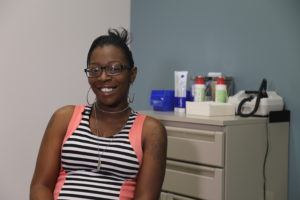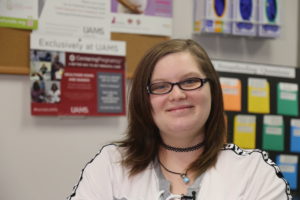Centering Pregnancy Program Produces Better Outcomes for Mothers and Babies
| When Shalinda Starks had her daughter 17 years ago, she did not feel as prepared as she does with the baby she is carrying now.

Shalinda Starks enjoys the education and camaraderie she receives from Centering Pregnancy Sessions.
For this pregnancy, Starks is getting her prenatal appointments through UAMS’s Centering Pregnancy program, a model of prenatal care in which patients see their health care providers in a group setting. The frequency of the sessions follow the same schedule as women who see their doctors one on one: every four weeks for the first two trimesters, and every two weeks as they get closer to delivery. The groups include eight to 10 women who have similar due dates.
“The women still get one-on-one time with providers, just as they would traditional prenatal appointments,” said Madeleine Robinson, RN, B.S.N., clinical services manager for UAMS’ Women’s Clinic. “The Centering sessions include group education, group activities and healthy snacks.”
This style of prenatal care is a growing trend across the country. UAMS started the Centering Pregnancy program in August 2018 and is the only place in the state that offers the option. “My favorite part is getting to know the other women in the appointment,” Starks said. “We share stories and experiences and have become close.”
Samantha Manees and Jen Freilino are first-time moms. In addition to the education provided by the doctors and nurses, they said they enjoy hearing from experienced mothers about what to expect.
“We cover a lot in session,” Manees said. “There were answers to questions I didn’t even know I had.”
“I’ve made new friends. We talked about making a private Facebook group, once we have our babies, to keep in touch,” Freilino said.

First-time mom, Jen Freilino, says she plans to stay in touch with her Centering Pregnancy group even after her baby is born.
There have been about 24 Centering Pregnancy groups at UAMS. Patients say they look forward to the sessions and have fun.
There are documented benefits to Centering Pregnancy programs. In the year since UAMS has been offering sessions, Robinson says they have noticed improved health outcomes for women and their babies who went through the program, including a significant increase in women who chose to breastfeed .
“Patients in Centering are engaged in their care,” Robinson said. “Not only do the women feel a sense of community, there is an increase in patient satisfaction.”

Clinical Services Manager Madeleine Robinson, RN says patients and providers enjoy the Centering Pregnancy program and data has proven its health benefits.
For now, the program is only available to women considered low risk for pregnancy complications. Robinson hopes to be able to expand the option to high-risk expectant mothers.

